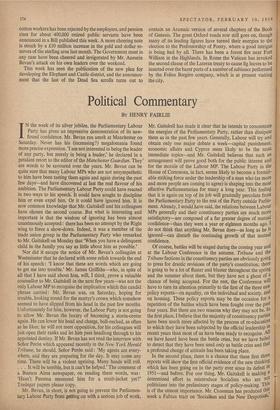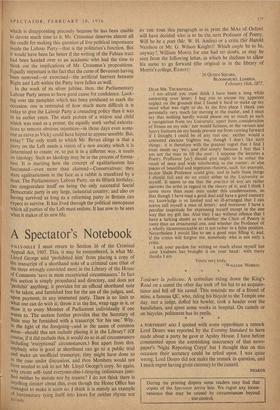Political Commentary
BY HENRY FAIRLIE IN the week of its silver jubilee, the Parliamentary Labour Party has given an impressive demonstration of its new- found confidence. Mr. Bevan ran amok at Manchester on Saturday. Never has his (increasing?) megalomania found more precise expression. 'I am not interested in being the leader of any party, but merely in being a leader,' he declared in a petulant retort to the editor of the Manchester Guardian. They' are words to be savoured over the years. Mr. Bevan can be quite sure that many Labour MPs who are not unsympathetic to him have been tasting them again and again during the past few days--and have discovered at last the real flavour of his ambition. The Parliamentary Labour Party could have reacted in two ways to his speech: It could have sought to discipline him or even expel him. Or it could have ignored him. It is now common knowledge that Mr. Gaitskell and his colleagues have chosen the second course. But what is interesting and important is that the wisdom of ignoring has been almost unanimously accepted : there has been no attempt by the Right wing to force a show-down. Indeed, it was a member of the trade union group in the Parliamentary Party who remarked to Mr. Gaitskell on Monday that 'When you have a delinquent child in the family you say as little about him as possible.'
Nor did it escape the notice of Mr. Bevan's colleagues at Westminster that he declared with some relish towards the end of his speech : 'I know that these are words which are going to get me into trouble.' Mr. James Griffiths—who, in spite of all that I have said about him, will, I think, prove a valuable counsellor to Mr. Gaitskell in the next few years—was not the only Labour MP to recognise the implication which this candid phrase carried : Mr. Bevan was, on Saturday, hoping for trouble, looking round for the martyr's crown which somehow seemed to have slipped from his head in the past few months. Unfortunately for him, however, the Labour Party is not going to allow Mr. Bevan the luxury of becoming a storm-centre again. He can lower his head and charge, bull-necked, as often as he likes; he will not meet opposition, for his colleagues will just open their ranks and let him pass headlong through to his appointed destiny. If Mr. Bevan has not read the interview with Serior Peron which appeared recently in the New York Herald Tribune, he should. Seilor PerOn said : 'My agents are every- where, and they are preparing for the day. It may come any time. There will be a violent uprising. Many heads will roll. . . . It will be terrible, but it can't be helped.' The comment of a Buenos Aires newspaper, on reading these words, was : 'Hasn't Panama measured him for a strait-jacket yet?' Tredegar papers please copy..
Mr. Bevan, in short, is not going to prevent the Parliamen- tary Labour Party from getting on with a serious job of work. Mr. Gaitskell has made it clear that he intends to concentrate the energies of the Parliamentary Party, rather than dissipate them as in the past few years. Generally, Labour will try and obtain only one major debate a week—capital punishment, economic affairs and Cyprus seem likely to be the most immediate topics—and Mr. Gaitskell believes that such all arrangement will prove good both for the public interest and for the morale of the Labour MP. The Labour Party in the House of Commons, in fact, seems likely to become a formid- able striking force under the leadership of a man who (as more and more people are coming to agree) is shaping into the most effective Parliamentarian for many a long year. This feeling that it is again on top of its job will gradually percolate from the Parliamentary Party to the rest of the Party outside Parlia- ment. Already, I would have said, the relations between Labour MPs generally and their constituency parties are much more satisfactory—are composed of a far greater degree of mutual confidence—than they were a year or eighteen months ago. 1 do not think that anything Mr. Bevan does—as long as he is ignored—can disturb the continuing growth of that mutual confidence.
Of course, battles will be staged during the coming year and at the Labour Conference in the autumn. Tribune and the Tribune factions in the constituency parties are obviously going to press for drastic revisions of the party's constitution; there is going to be a lot of fluster and bluster throughout the spring and the summer about them, but they have not a ghost of a chance of being accepted. For the rest, the Conference will have to turn its attention primarily to the first of the three new policy reports—on equality, on the individual and society, and on housing. These policy reports may be the occasion for a repetition of the battles which have been fought over the past four years. But there are two reasons why they may not be. 10 the first place, I believe that the majority of constituency parties have been much more affected by the process of re-education to which they have been subjected by the official leadership iti, recent years than most of us have been ready to recognise. All we have heard have been the battle cries, but we have failed to detect that they have been used only as battle cries and that a profound change of attitude has been taking place. In the second place, there is a chance that these first three reports will show the first official evidence of the new thinking which has been going on in the party ever since its defeat in 1951—and before. For one thing, Mr. Gaitskell is making 3 determined effort to reintroduce Socialists who are not politicians into the preliminary stages of policy-making. This is of the utmost importance. Mr. Crossman has produced this week a Fabian tract on 'Socialism and the New Despotism which is disappointing precisely because he has been unable to devote much time to it. Mr. Crossman deserves almost all the credit for making this question of live political importance inside the Labour Party—that is the politician's function. But it would have been far better if the writing of the Fabian tract had been handed over to an academic who had the time to think out the implications of Mr. Crossman's propositions. Equally important is the fact that the curse of Bevanism having been removed—or exorcised—the artificial barriers between Right and Left within the Party have fallen as well.
In the week of its silver jubilee, then, the Parliamentary Labour Party seems to have good cause for confidence. Look- ing over the pamphlet which has been produced to mark the occasion, one is reminded of how much more difficult it is today to give the Labour Party a crusading policy than it was in its earlier years. The stark picture of a widow and child which was used as a poster, the equally stark verbal exhorta- tions to remove obvious injustices—in those days even some- one as naive as Vicky could have hoped to appear sensible. But, today'? The only truth to which Mr. Bevan clings is that a Party on the Left needs a vision of a new society which it is determined to create; or, to put it in a different way. it needs an ideology. Such an ideology may be in the process of forma- tion. It is startling how the concept of egalitarianism has fascinated—even more than alarmed—Conservatives; they stare egalitarianism in the face as a rabbit is transfixed by a stoat. The Parliamentary Labour Party, on its fiftieth birthday, can congratulate itself on being the- only successful Social Democratic party in any large, industrial country; and also on having survived as long as a reforming party in Britain can expect to survive. It has lived through the political menopause which all parties of the Left must endure. It has now to be seen what it makes of its new life.



































 Previous page
Previous page